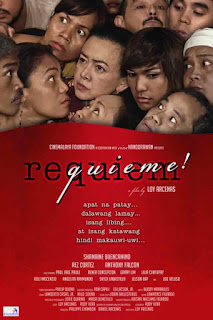CINEMALAYA 2012: REQUIEME (Loy Arcenas, 2012)
A lot of films in recent memory have ventured on the eccentricity and uniqueness of Filipino culture in terms of death and dying- of particular mention are Soxie Topacio's DED NA SI LOLO (Grandpa is Dead) and Gil Portes' TWO FUNERALS. Loy Arcenas' REQUIEME! dives into the same pool, but here death is used as an instrument for catharsis, rather than as its central theme.
The film opens with a news item about an OFW who met an accident while on duty. The OFW's wife patiently waits and grieves for her husband's remains. Meanwhile, a renowned and controversial fashion designer infamous for his flamboyant lifestyle is international headlines when he is murdered by an unknown assailant.
Dressmaker Joanna (Anthony Falcon) mourns the passing of his idol, fashion designer Vidal Valler, more popularly known as "V.V." Meanwhile in the provinces, the barangay of Sta. Maria is shocked when V.V.'s murderer turns out to be a Filipino, named Adolf Payapa, and he is related to the barangay chairwoman Swanie (Shamaine Centenera Buencamino).
Back in Manila, another death occurs. A close friend of Joanna's succumbs to pneumonia. Bureaucracy, financial difficulties, and an ambivalent search for families ensue.
Swanie is persuaded to run as town councilor, eventually using the international incident created by her estranged nephew to gain popularity. Director Loy Arcenas and screenwriter Rody Vera attacks the Filipino political subculture of opportunism with subtle but biting humor.
Joanna has issues of his own. Plans for his breast implant surgery are currently put on hold, and all the while there is a lingering reference to his former life, back when he is still in good terms with his parents.
Surprisingly, death is not REQUIEME's central theme, but homophobia. Amidst the humor and the nerve-wracking preparations for a funeral, snippets of homophobia abound in tiny, sharp instances. Vera and Arcenas confronts us with how society often treats the third sex, and what repercussions such actions bring. The instant events that befall both Joanna and Swanie are direct biting ironies of their issues as estranged mother and son. You can see Swanie's determination to recover the remains of his nephew Adolf, but in truth she is compensating for the lost time and the missed opportunity to make amends with her only child.
REQUIEME also stands as a cinematic tool for empowering the third sex. Through its learned and insightful portrayal of Joanna, a homosexual, as an ordinary person like the rest of us, and with his boyfriend in the movie who is deeply in love with him, and who honestly understands his struggles, we can relate not only to the scenario but also to the larger issues of gender quality and pro-choice stance. If you are a homosexual, it will probably uplift you, or challenge you. If you are straight, the film will prompt you to reevaluate your attitude towards the third sex.
One downfall though of REQUIEME is that it takes quite a while to develop its story. Much emphasis is bestowed in minor characters, however mundane the conversation. By the time we get to the story conflict, chances are you'd be looking at your watch about once or twice. But once veteran bit player Lilia Cuntapay appears onscreen as the barangay's de facto historian, the film gets real exciting. The tableaux scenes are especially hilarious.
The film ends on a suspended arc; there is no real resolution, no proper close. But what REQUIEME achieves in the end is to force both Joanna and Swanie to face their personal demons, realizing the measure of their strength and resolve in the process. Also, the heavily-talked about final frame of the movie, where we see a lot of television sets at a surplus shop- I think it may signify that life is one big television show- cyclical, never-ending, oftentimes dramatic, surprising, or even farcical, but mostly it doesn't usually give the answers that we want.
RATING: 4/5


Comments
Post a Comment